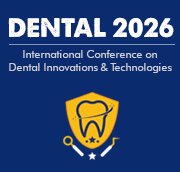Title : The importance of mouth care for inpatients – A service evaluation of mouth care referrals at east surrey hospital
Abstract:
Background: People aged 65 and over account for over 40% of hospital admissions and occupy around two-thirds of hospital inpatient beds. Hence in all hospitals, there is likely to be a high proportion of older adults often experiencing symptoms related to their oral health. Poor oral health can impact eating and drinking, communication, and general well-being and lead to increased frailty. Training in oral health can be challenging due to a high staff turnover. Mouth Care Matters (MCM) was a Health Education initiative to improve mouth care standards in hospitals and empower staff through training and education to identify people needing help with mouth care and ensure it is delivered safely and compassionately. The initiative was developed at Surrey and Sussex Health Care NHS Trust and then rolled out nationally across 46 trusts in England. MCM advocates the role of a mouth care lead nurse, who is a dental nurse, to work across a trust to ensure the infrastructure is present to provide effective mouth care. This includes implementing policies, hands-on staff training and ensuring access to suitable mouth care products in all wards. In addition to providing training, there is a pathway for health care professionals (HCP) to contact the MCM lead for oral health advice or to signpost to the dental team when needed.
Aim: To raise awareness on the importance of providing good mouth care for inpatients and through the evaluation, examine the main reasons HCPs refer for mouth care advice and the outcomes.
Method: The evaluation looked at 200 patients seen in the last two years, and data was collected on; age, primary diagnosis, the reason for referral, outcome, and if the patient was on an end-of-life pathway or is now deceased.
Results: 91% of patients were aged over 65, and all were referred for mouth care reasons. The most common reasons for advice were managing dry mouth, loose dentures and poor oral hygiene. 19% were signposted to their medical team, who diagnosed ulcers or candida infection. 15% were referred to the onsite dental department. 42% of patients seen are now deceased.
Discussion: Nearly half the patients seen by the MCM lead in the last year are now deceased, suggesting that oral health symptoms, especially dry mouth, are common at the end of life. Oral health can change and deteriorate rapidly at the end of life with changes in self-care, comorbidities, and an increase in polypharmacy. The MCM lead serves as a point of contact who can offer guidance and direct individuals to medical or dental teams when necessary. This not only enhances the quality of life for patients but also facilitates specialised training for HCPs.
Action and recommendations: The evaluation highlights the value of having a dedicated MCM lead, as they can be an integral part of the hospital team caring for patients and contributing to educating staff, which should be encouraged in every hospital trust.
Audience Take Away:
- Professionals in healthcare settings, especially those involved in patient care and management, can apply the insights from this research to enhance the oral health care provided to older adults
- The information can be used to raise awareness about the importance of good mouth care for inpatients, and the specific reasons for referrals outlined in the study can guide healthcare practitioners in identifying and addressing oral health issues effectively, leading to shorter recovery times and therefore shorter hospital stays. This would lead to a more efficient service in hospitals with a higher volume of patients being seen
- Healthcare professionals, including nurses and dentists, and other staff involved in patient care, can benefit by gaining a deeper understanding of the common oral health issues experienced by older patients
- The research highlights the importance of specialised training, the role of a dedicated MCM lead, and the impact on end-of-life care. This knowledge can contribute to improving patient outcomes, streamlining oral health care procedures, and enhancing overall patient well-being
- Other faculty, especially those involved in healthcare education and research, can use this study to expand their understanding of oral health in older adults. The methodology and outcomes can serve as a basis for further research, and the emphasis on the role of a dedicated MCM lead provides a potential model for improving oral health care standards in different healthcare settings
- While the primary focus is on healthcare practices, the research indirectly suggests a practical solution for healthcare system designers. The implementation of a Mouth Care Matters initiative, with a dedicated MCM lead, can be considered a model for designing effective structures within hospitals to ensure the provision of quality oral health care for inpatients. This could simplify the coordination of resources, policies, and training efforts.
- The research contributes valuable information for healthcare designers by emphasising the need for a structured approach to oral health care, especially for older patients. Implementing similar initiatives can lead to more accurate and efficient designs within healthcare systems, ensuring that oral health is appropriately addressed in patient care protocols.
- Other Benefits Include:
- Enhanced Patient Quality of Life: The research suggests that improved oral health care contributes to an enhanced quality of life for patients.
- Efficient Referral Systems: The study highlights a pathway for healthcare professionals to seek advice or refer patients to dental teams, streamlining the referral process.
- End-of-Life Care Considerations: The findings shed light on oral health symptoms at the end of life, providing insights for designing and implementing specialised care for patients in this stage.
- Educational Contributions: The research underscores the role of education and training, benefiting not only patient care but also contributing to the



